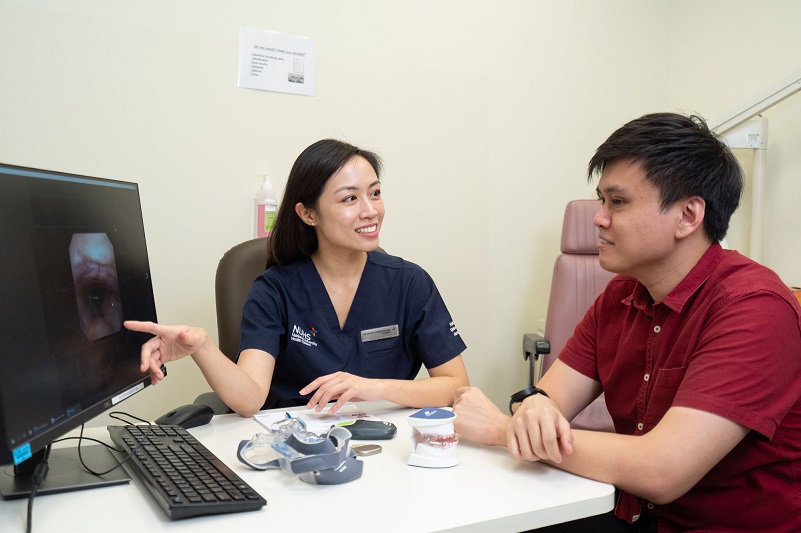EnvisioningHealth - Changing Lives One Idea at a Time | Health Dispatch
Sleepless slumber in Singapore:
a silent epidemic?
Amidst the city-state’s rising wave of sleep disorders,
a novel treatment offers a ‘dreamier’ solution to traditional, clunky remedies.
Issue 2 | September 2023

 Subscribe and ensure you don't miss the next issue!
Subscribe and ensure you don't miss the next issue!
Picture this: A young professional accustomed to the daily grind wakes up more tired than the day before—even after a seemingly sound sleep. Meanwhile, his partner is increasingly worried about his nightly snoring, sometimes punctuated with sudden, alarming cessations of breath.
This isn’t a simple case of poor sleep hygiene—it’s the sign of
obstructive sleep apnoea (OSA), a sleep disorder that affects a staggering one in three Singaporeans. Many are unaware they are affected.
Those with the sleep disorder stop breathing repeatedly during slumber, due to a full or partial blockage in their airway. This leads to low oxygen levels and fragmented sleep which manifests as daytime fatigue, ‘brain fog’, and morning headaches.
Decoding the surge in sleep issues
Hospitals in Singapore have recently observed an uptick in sleep disorder cases, with the majority of patients diagnosed with OSA. A sedentary lifestyle that has remained in recent years as a result of physical restrictions during COVID-19 has undeniably increased the prevalence of OSA, with many gaining “COVID kilos”. Other factors amplifying the risk include advancing age, as well as smoking and drinking habits.
“Interestingly, the pandemic, while fostering familial bonds, might have also inadvertently revealed the sleeping quirks or abnormalities of our loved ones, says Dr Cheong. “Many patients have been prompted to seek medical assistance as a result of concerned or complaining bed partners.”
Fixing your sleep schedule
Historically, the treatment of OSA has been dominated by continuous positive airway pressure (CPAP) machines which many feel are cumbersome. These machines, which require users to don a mask on their face throughout the night, hardly make for a cosy night’s rest.
Now, a new treatment could help patients with OSA breathe better while sleeping in comfort. Albeit new to Singapore, the treatment has served over 50,000 patients across the US and Europe since 2014. Termed
hypoglossal nerve stimulation (HGNS) therapy, this therapy entails implanting a tiny device in the neck and chest of the patient via surgery. The device sends a gentle electrical stimulation to the tongue every time it detects a patient is about to breathe in during sleep, prompting the tongue to move forward and ensuring an unobstructed airway. This treatment offers a more comfortable alternative to conventional CPAP machines as there is nothing strapped onto the patient.
“Inserting the implant is a relatively simple procedure,” says Dr Cheong. “Patients may leave the hospital on the day of surgery without any restriction on their usual eating and speaking habits.”
That said, it’s crucial to consult a medical professional before opting for HGNS. For instance, only those with moderate to severe OSA are eligible for the treatment. Additionally, interested patients must also undergo a brief examination called drug-induced sleep endoscopy to ensure they are suitable candidates.
The power of restorative rest
Although there are many treatment avenues for sleep breathing issues, awareness and preventative steps to promote good sleep from a holistic perspective are important. The fundamental emphasis must be on understanding and prioritising sleep’s crucial role in overall health.
Accounting for nearly a third of our lives, sleep is essential for cognitive function, emotional equilibrium, and cardiovascular vitality. To ensure sound sleep, consider adopting the following strategies:
- Refrain from using electronic devices close to bedtime—their blue light can disrupt our sleep-wake cycle
- Set aside some quiet moments to relax and unwind before hitting the sheets—be it through reading, meditation, or a warm bath
- Engage in at least 30 minutes of brisk exercise daily, as it can help improve sleep quality
- Abstain from smoking and limit alcohol consumption, both of which can interfere with restful sleep
- Soak in some sunlight during the day
The recommended sleep duration for adults ranges between seven to nine hours nightly. As the day winds down and the night beckons, keep this in mind: investing in good sleep is an investment in good health.
Like this article? Simply subscribe to make sure you don't miss the next issue of EnvisioningHealth!
